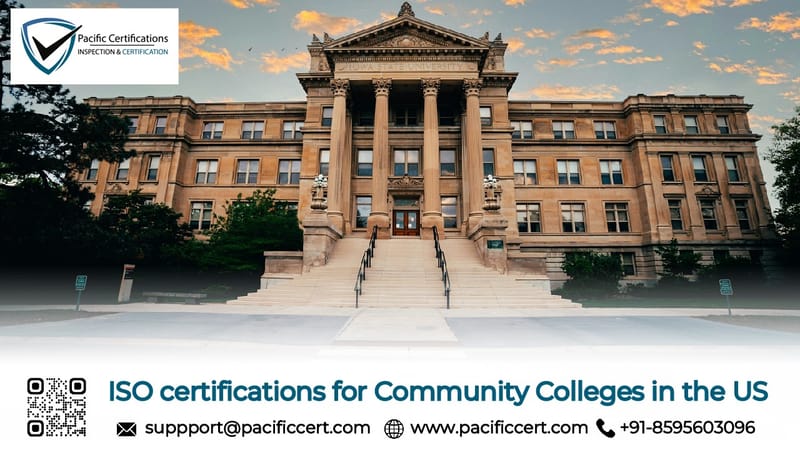ISO Certifications for Community Colleges in the US, Requirements and Benefits

Community colleges in the United States play a critical role in the education system, offering accessible and affordable education to millions of students. As these institutions strive to improve educational standards and student satisfaction, ISO certifications have emerged as a powerful tool. Achieving ISO certification demonstrates a commitment to quality, safety, and continuous improvement, which can significantly enhance the credibility and competitiveness of community colleges.
In this blog, we will explore the applicable ISO standards for community colleges, the requirements and benefits of ISO certification, and how we at Pacific Certifications can assist with the audit and certification process.
Applicable ISO Standards for Community Colleges
ISO offers a variety of standards that can be relevant to community colleges. These standards provide a framework for quality management, information security, and other critical aspects of operations. Here are some of the most applicable ISO standards for community colleges:
ISO 9001: Quality Management Systems
ISO 9001 is the most widely recognized standard for quality management systems (QMS). It provides a framework for consistently meeting customer (in this case, student and staff) requirements and enhancing their satisfaction.
ISO 21001: Educational Organizations Management Systems
ISO 21001 is a specific standard designed for educational organizations. It provides a management tool for educational institutions to meet the needs and expectations of students and other stakeholders. This standard emphasizes a learner-centered approach and can be instrumental in improving the effectiveness and efficiency of educational services.
ISO 27001: Information Security Management Systems
ISO 27001 certification for information security management systems (ISMS) is crucial, it helps community colleges protect student data, intellectual property, and other critical information from cyber threats.
ISO 45001: Occupational Health and Safety Management Systems
ISO 45001 is the international standard for occupational health and safety (OHS) management systems. For community colleges, this standard helps to ensure a safe learning and working environment for students, faculty, and staff, reducing the risk of accidents and improving overall safety culture.
ISO 14001: Environmental Management Systems
ISO 14001 certification for environmental management systems helps community colleges to reduce waste, improve energy efficiency, and demonstrate a commitment to sustainability.
Click here to find out more applicable standards to your industry
Requirements for ISO Certifications for Community Colleges
Achieving ISO certification requires community colleges to meet specific requirements. Below is an overview of the general requirements for some of the key ISO standards applicable to community colleges:
ISO 9001: Quality Management Systems
- Leadership Commitment: The college’s leadership must be committed to implementing and maintaining a quality management system.
- Process Approach: The college must adopt a process-oriented approach to managing activities, ensuring that processes are well-defined, monitored, and improved.
- Risk-Based Thinking: The college must identify and address risks and opportunities that could affect the quality of education and services.
- Continual Improvement: The college must establish mechanisms for continuous improvement of its processes and systems.
- Customer Focus: The needs and expectations of students and other stakeholders must be consistently met and exceeded.
ISO 21001: Educational Organizations Management Systems
- Context of the Organization: The college must understand its context, including the needs and expectations of students and other stakeholders.
- Learner-Centered Approach: The college must focus on enhancing the learning experience and outcomes for students.
- Engagement of Interested Parties: The college must involve students, parents, staff, and other stakeholders in the decision-making process.
- Leadership and Governance: Effective leadership and governance structures must be in place to ensure the quality and effectiveness of educational services.
ISO 27001: Information Security Management Systems
- Information Security Policy: The college must establish and implement an information security policy that aligns with its objectives.
- Risk Assessment and Treatment: The college must conduct a thorough risk assessment to identify potential security threats and implement appropriate controls.
- Asset Management: The college must manage information assets, including student data and intellectual property, to ensure their security.
- Access Control: The college must establish controls to manage access to sensitive information, ensuring that only authorized personnel can access it.
ISO 45001: Occupational Health and Safety Management Systems
- Hazard Identification and Risk Assessment: The college must identify workplace hazards and assess the associated risks to students, faculty, and staff.
- Legal and Other Requirements: The college must comply with all relevant health and safety regulations and standards.
- Occupational Health and Safety Policy: The college must establish a policy that outlines its commitment to providing a safe learning and working environment.
- Emergency Preparedness and Response: The college must prepare for and respond to emergency situations, such as natural disasters, accidents, or health crises.
ISO 14001: Environmental Management Systems
- Environmental Policy: The college must develop and implement an environmental policy that reflects its commitment to sustainability.
- Environmental Aspects: The college must identify and manage its environmental aspects, such as energy consumption, waste generation, and resource use.
- Compliance Obligations: The college must comply with all relevant environmental regulations and standards.
- Continual Improvement: The college must establish mechanisms for continuously improving its environmental performance.
Benefits of ISO Certification for Community Colleges
Achieving ISO certification offers a wide range of benefits for community colleges, including:
- ISO certifications are globally recognized and demonstrate a commitment to quality, safety, and sustainability.
- ISO standards provide a framework for streamlining processes and reducing inefficiencies.
- ISO 9001 and ISO 21001 standards emphasize a customer (student) focus and continuous improvement.
- ISO 27001 certification helps community colleges protect sensitive information, such as student records and intellectual property, from cyber threats.
- ISO 45001 certification ensures that community colleges have effective health and safety management systems in place.
- ISO 14001 certification demonstrates a commitment to environmental sustainability.
How Pacific Certifications Can Help
At Pacific Certifications, we understand the unique challenges and needs of community colleges. We specialize in providing ISO certification services, helping educational institutions achieve and maintain compliance with international standards. Our role is to audit your management systems and certify them against the relevant ISO standards. Here’s how we can assist your community college:
Independent Audit and Certification
As a certification body, we conduct independent audits to assess your college’s compliance with the relevant ISO standards. Our auditors are experienced professionals who understand the specific requirements of educational institutions. We ensure that your management systems meet the necessary criteria for certification.
Expertise in Education Sector
We have extensive experience working with educational institutions, including community colleges. Our auditors are familiar with the unique challenges faced by colleges and can provide valuable insights during the certification process.
Comprehensive Certification Services
We offer certification services for a wide range of ISO standards, including ISO 9001, ISO 21001, ISO 27001, ISO 45001, and ISO 14001. Whether your college is looking to enhance quality, improve information security, or demonstrate environmental sustainability, we can help.
Commitment to Continuous Improvement
We believe in the value of continuous improvement, which is a core principle of ISO standards. Our certification process is designed to not only assess your current compliance but also identify opportunities for improvement, helping your college achieve long-term success.
Global Recognition
ISO certifications from Pacific Certifications are globally recognized and respected. By achieving certification through us, your community college can demonstrate its commitment to international standards, enhancing its credibility and reputation.
ISO certifications offer significant benefits for community colleges in the United States, from enhancing reputation and credibility to improving operational efficiency and student satisfaction. By adopting ISO standards such as ISO 9001, ISO 21001, ISO 27001 etc, community colleges can demonstrate their commitment to quality and sustainability.
At Pacific Certifications, we are dedicated to helping community colleges achieve ISO certification through our independent audit and certification services. We understand the unique needs of educational institutions and are committed to providing expert guidance and support throughout the certification process.
If your college is ready to take the next step towards ISO certification, contact us today. Our team of experienced auditors is here to help you navigate the certification process and achieve compliance with international standards.
Pacific Certifications is accredited by ABIS, in case you need support with ISO certification for your Community College in the US, please contact us at [email protected] or +91-8595603096.
Read More at: Blogs by Pacific Certifications

